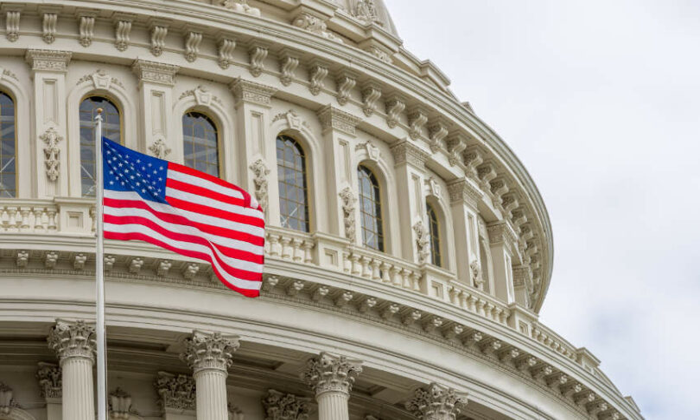The U.S. stablecoin bill, formally known as the “Guiding and Establishing National Innovation for U.S. Stablecoins” (GENIUS Act), is poised to make significant strides in the Senate, potentially passing as early as next week. This groundbreaking legislation comes as a response to the burgeoning demand for stablecoin regulation, ensuring that consumer protections are at the forefront while fostering innovation within the crypto industry. Senators Bill Hagerty and Kirsten Gillibrand, representing both sides of the aisle, have championed this bill, highlighting its importance in establishing a clear legal framework for stablecoin issuers. As discussions intensify, emerging hurdles related to consumer safety and corporate involvement have sparked debate among lawmakers. Ultimately, the passage of this Senate bill could mark a pivotal moment in U.S. crypto regulation, defining how stablecoins fit into a rapidly evolving financial landscape.
The ongoing discussions surrounding this crucial piece of legislation highlight the increasing attention stablecoins are attracting from policymakers. Known for their value stability tied to traditional currencies, these digital assets represent a significant evolution in the financial ecosystem. The proposal led by Senators Hagerty and Gillibrand aims to establish comprehensive regulatory guidelines, addressing both innovation and consumer safety. As bipartisan support builds, the anticipated changes could reshape the regulatory landscape for cryptocurrencies and pave the way for safer adoption. With the rising popularity of digital currencies, proactive legislation such as this is essential for ensuring a balanced integration of crypto into the broader financial market.
The U.S. Stablecoin Bill: A Pivotal Moment for Crypto Regulation
The U.S. stablecoin bill, formally known as the GENIUS Act, represents a crucial step forward in regulatory frameworks for the cryptocurrency industry. As Senator Bill Hagerty prepares to lead the discussions, there is palpable excitement surrounding the potential passage of this legislation in the Senate next week. This bill aims to establish a comprehensive regulatory structure that not only supports innovation in the stablecoin sector but also addresses consumer protection concerns. It marks an important moment in U.S. history as lawmakers recognize the significance of stablecoins in the global financial ecosystem, particularly as they serve vital roles in facilitating crypto trading activities.
Supporters of the U.S. stablecoin bill, including prominent legislators like Senator Kirsten Gillibrand, highlight the bipartisan effort that underpins this initiative. The collaboration between Democrats and Republicans underscores the urgency of creating clear regulations that can guide the responsible use of digital currencies. The consistent dialogue surrounding stablecoin legislation reflects the evolving landscape of financial technologies and emphasizes the need for robust frameworks that can mitigate potential risks while fostering economic growth.
Key Features of the GENIUS Act
The GENIUS Act outlines critical provisions aimed at regulating stablecoin issuers comprehensively. Central to the bill is the exclusion of large public companies from acting as issuers of these digital tokens to safeguard consumer interests. By focusing on responsible issuance, lawmakers are not just prioritizing innovation but also acknowledging the potential risks posed by predominantly corporate-driven cryptocurrency solutions. Consumer advocates have raised flags about the possibility of private companies, such as social media platforms, still having access to produce stablecoins, thereby necessitating rigorous monitoring as this legislation progresses.
Additionally, the GENIUS Act emphasizes strong consumer protections, aiming to build trust and confidence in the crypto market. These measures are pivotal, as they assure users that their investments in stablecoins are safeguarded against misuse. The evolving discourse on stablecoin legislation and consumer rights highlights the imperative for lawmakers to strike a delicate balance between fostering innovation and ensuring that the framework does not leave room for exploitation, particularly by large corporations or unregulated entities.
Bipartisan Support: A Necessity for Passage
The bipartisan support for the U.S. stablecoin bill is crucial for its successful passage in the Senate. With the diverse political landscape of the current Senate, both parties recognize the potential impact of stablecoins on the future of finance. Senator Gillibrand’s remarks emphasize the collaborative nature of drafting this essential piece of legislation, and her optimism reflects the growing understanding among legislators that a united front is necessary. Despite previous setbacks, the goal of achieving a mutual agreement on the bill’s provisions is paramount for advancing U.S. crypto regulation.
Moreover, the indication that the Senate may soon put the GENIUS Act to a vote adds urgency to discussions. The involvement of Senators from both sides highlights the acknowledgment of stablecoins as not just a financial tool but as a significant component in a rapidly digitizing economy. This cooperation is essential to mitigate the risks associated with crypto regulation and to serve the interests of consumers while encouraging technological advancement in the sector.
Challenges Ahead for the U.S. Stablecoin Bill
Despite the optimism surrounding the GENIUS Act, significant challenges remain as the Senate prepares for its vote. Democrats have raised concerns about consumer protections, indicating that further negotiations may be needed to address some last-minute objections that emerged during discussions. These hurdles could potentially delay the bill’s passage, which underscores the volatility and complexity of achieving consensus in legislative processes involving cryptocurrencies.
Furthermore, the differing opinions on the role of large corporations in stablecoin issuance could complicate discussions. Lawmakers must navigate these concerns delicately to ensure that the bill not only gains the necessary votes but also serves as a comprehensive regulatory framework that addresses all stakeholders’ interests, including consumers, investors, and the cryptocurrency market.
The Role of Consumer Protection in Stablecoin Legislation
Consumer protection remains a vital aspect of the discussions surrounding the U.S. stablecoin bill. Advocates are pushing for strong safeguards to ensure that investors and users of stablecoins can engage with confidence and security in this evolving market. As Senator Gillibrand articulates, the legislation provides an opportunity to establish guidelines that not only protect consumers but also foster innovation through responsible practices. This push for consumer protections is pivotal in retaining public trust and sustaining the viability of stablecoins within the financial ecosystem.
Moreover, as the market for stablecoins continues to grow, the necessity for defined protections becomes increasingly evident. Consumers deserve assurances that their investments in stablecoins are secure and that issuers are held accountable for their actions. As negotiations unfold, lawmakers must prioritize these protections to mitigate risks and establish a safe framework for stablecoin usage, ultimately striving to balance innovation with the need for robust oversight.
The Future of Stablecoin Regulation in the U.S.
As the discussion around the U.S. stablecoin bill unfolds, there is a broader conversation about the future of stablecoin regulation in the U.S. The passage of the GENIUS Act could set a precedent for how other cryptocurrencies are regulated, potentially influencing global standards for digital financial products. With increasing interest and adoption of stablecoins, regulatory frameworks will need to keep pace to satisfy the evolving needs of consumers and market players alike.
Looking beyond the immediate legislative efforts, the establishment of a solid regulatory foundation for stablecoins in the U.S. could spur innovation across the cryptocurrency landscape. It could pave the way for further legislative initiatives aimed at addressing challenges posed by emerging fintech solutions. The proactive approach to regulation demonstrated in the GENIUS Act may signal a shift towards a more robust regulatory environment that seeks to maximize the benefits of cryptocurrencies while safeguarding users against associated risks.
Implications of Crypto Regulation on Financial Stability
The potential passage of the stablecoin bill carries profound implications for overall financial stability in the U.S. By regulating stablecoin issuers, the GENIUS Act aims to mitigate risks that could arise from unregulated digital currencies affecting traditional financial systems. Stablecoins, particularly those pegged to the U.S. dollar, have become integral to the functioning of various digital economic activities; thus, ensuring their responsible use is critical to maintaining market integrity.
Implementing effective regulations surrounding stablecoins may also strengthen the relationship between traditional financial institutions and the cryptocurrency sector. As more frameworks are established, there is potential for collaboration that could enhance financial services, driving innovation while ensuring consumer protection remains a fundamental priority. The evolving regulatory landscape represents an opportunity for structured growth within a diverse financial ecosystem.
The Importance of Legislative Clarity for Stablecoin Innovators
For innovators operating within the stablecoin space, legislative clarity is paramount. As the U.S. stablecoin bill moves through the Senate, it is crucial for developers, issuers, and stakeholders to understand the regulatory environment. Clear guidelines provided by the GENIUS Act can significantly shape business models and operational strategies, facilitating greater innovation without the fear of violating ambiguous regulations.
Establishing a transparent regulatory framework will enable entrepreneurs to navigate the complexities of compliance while focusing on technological advancements. This proactive approach to legislation not only protects businesses but also fosters a thriving environment where creativity and financial technologies can flourish in harmony with consumer safety.
Understanding the Genesis of Stablecoin Legislation
The genesis of stablecoin legislation reflects ongoing shifts within the economic landscape, as policymakers recognize the transformative potential of digital currencies. The U.S. stablecoin bill is the culmination of years of deliberation among lawmakers, regulators, and industry stakeholders, all contributing insights into the risks and rewards of digital assets. As discussions gain momentum in the Senate, it is clear that stablecoins have become more than just a niche financial product; they play an essential role in the broader financial markets.
The legislative journey towards the GENIUS Act underscores the importance of collaboration among various factions, highlighting the need for a comprehensive understanding of the benefits and challenges presented by stablecoins. By addressing these fundamental aspects through structured legislation, there is an opportunity to guide the future of stablecoin usage in the U.S. and beyond, ensuring that they contribute positively to economic stability and innovation.
Frequently Asked Questions
What is the U.S. stablecoin bill and what does it aim to achieve?
The U.S. stablecoin bill, formally known as the GENIUS Act, aims to establish a regulatory framework for stablecoins in the United States. It seeks to create standards for issuers, enhance consumer protection, and promote innovation in the crypto space, ensuring that stablecoins, often pegged to the U.S. dollar, are safely integrated into the financial system.
Who are the key supporters of the U.S. stablecoin bill?
Key supporters of the U.S. stablecoin bill include Senator Bill Hagerty and Senator Kirsten Gillibrand, who have both advocated for stablecoin legislation. Their bipartisan effort is crucial in promoting a regulatory framework that addresses consumer protection and fosters innovation within the cryptocurrency industry.
What challenges has the U.S. stablecoin bill faced in the Senate?
The U.S. stablecoin bill has faced challenges such as last-minute objections from Democrats regarding consumer protection and potential abuses by large corporations. Recent negotiations have also seen volatility, with earlier attempts to advance the bill encountering setbacks during voting procedures in the Senate.
How does the U.S. stablecoin bill differ from previous crypto legislation?
The U.S. stablecoin bill, specifically the GENIUS Act, differs from previous crypto legislation by focusing specifically on stablecoins and providing a detailed regulatory framework. Unlike earlier bills that sought broader crypto regulations, this bill narrows down on payment stablecoins and their role in the financial system.
What role does Kirsten Gillibrand play in the U.S. stablecoin bill?
Kirsten Gillibrand plays a significant role in championing the U.S. stablecoin bill as a co-sponsor and advocate. She emphasizes the importance of implementing robust consumer protections within the legislation while supporting innovation in stablecoin technology, aiming to strike a balance that benefits both consumers and the crypto industry.
When is the U.S. stablecoin bill expected to be debated and potentially passed?
The U.S. stablecoin bill is anticipated to be debated and potentially passed in the Senate as soon as next week, according to supporters like Senator Bill Hagerty. The timeline could be influenced by ongoing negotiations and the need for bipartisan agreement to secure the required votes.
What are the implications of the U.S. stablecoin bill for the crypto market?
The implications of the U.S. stablecoin bill for the crypto market include establishing formal regulations for stablecoin issuers, which could lead to increased investor confidence and market stability. With clear guidelines, the legislation may also foster innovation and expansion of stablecoin use in various financial applications.
What consumer protections are included in the U.S. stablecoin bill?
The U.S. stablecoin bill includes consumer protections that address concerns raised during its drafting process, such as preventing large public companies from issuing stablecoins. The legislation aims to ensure that consumer rights are safeguarded while still encouraging responsible innovation within the stablecoin sector.
How does the GENIUS Act impact large corporations involved in stablecoin?
The GENIUS Act impacts large corporations by explicitly stating that companies like Meta will not be approved as issuers of stablecoins. This provision aims to mitigate risks associated with stablecoin issuance by large entities, while potentially allowing smaller, private companies to participate in the market under regulatory scrutiny.
| Key Point | Details |
|---|---|
| U.S. Stablecoin Bill Expected to Pass | Senators Bill Hagerty and Kirsten Gillibrand indicate the U.S. stablecoin bill could clear the Senate next week. |
| Bipartisan Support | The bill has seen support from both Republican and Democrat senators, despite last-minute objections from Democrats. |
| GENIUS Act | The legislation is titled “Guiding and Establishing National Innovation for U.S. Stablecoins” (GENIUS) Act. |
| Consumer Protection Concerns | The latest draft of the bill includes modifications to address Democrats’ concerns about consumer protection and national security. |
| Future of Stablecoins | Senators emphasize the importance of regulating stablecoins to ensure responsible innovation in the financial sector. |
Summary
The U.S. stablecoin bill, also known as the GENIUS Act, is poised to make significant strides in the Senate next week, aiming to establish essential regulatory frameworks for stablecoins. With bipartisan support, this legislation could shape the future of digital currencies in the U.S. while prioritizing consumer protections and encouraging innovation. As the debate unfolds, stakeholders in the cryptocurrency industry are hopeful for a historical passage that would facilitate responsible growth within the financial landscape.
The U.S. stablecoin bill is poised to make significant waves in the financial landscape as it heads for discussion in the Senate next week. Spearheaded by Senators Bill Hagerty and Kirsten Gillibrand, this legislation, known as the GENIUS Act, aims to establish essential regulatory frameworks for payment stablecoins in the United States. As stablecoin legislation gains momentum, it promises to provide clarity and security in the burgeoning crypto market, which has faced scrutiny and uncertainty. With bipartisan support, the Senate bill could pave the way for a new era of crypto regulation, addressing concerns around consumer protection and corporate involvement. As proponents rally behind the measure, the potential passage of this landmark legislation signals a commitment to fostering innovation while safeguarding economic interests.
As discussions unfold around the impending crypto regulation, attention turns to the forthcoming Senate initiative designed to stabilize the rapidly evolving digital currency ecosystem. This legislative push, while primarily focused on stablecoin management, encapsulates a broader commitment to discerning legal boundaries for digital assets. The GENIUS Act represents lawmakers’ efforts to introduce systematic oversight while encouraging growth in the payment sector of cryptocurrencies. With prominent figures like Senator Kirsten Gillibrand advocating for consumer safeguards, this Senate bill strives to balance innovation with essential protections, addressing the complexities that arise with stablecoin usage in financial transactions. The outcome of this regulatory framework could influence the direction of digital currencies well beyond American borders.














